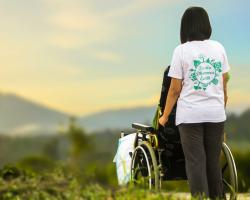“Keep away from sweets" is the basic principle in the diet of diabetics, regardless of whether they suffer from type 1 or type 2 diabetes. In general, the little-and-often approach is recommended, preferably with a large proportion of lean meats and vegetables.
Diabetes manifests itself with excessive levels of blood glucose, but also with other metabolic disorders. As much as 90 percent of cases of this disease are type 2 diabetes, most frequently related to the patient’s being overweight and the lack of physical activity in his or her lifestyle.
Type 1 diabetes
The highest levels of type 1 diabetes incidence are among children and adolescents, but adults are also not excluded from the risk. In this disease the body destroys the cells that produce insulin, and this is why patients suffering from it need to be administered insulin on a regular basis.
Every person suffering from diabetes type 1 needs to know the precise amount of carbohydrate exchange and protein-fat exchange contained in food products they consume so as to be able to calculate the appropriate amount of insulin to be taken at mealtimes.
“If the patient is well-educated, he or she will be able to match the insulin dose with the amount of energy provided by the meal they eat," says Professor Leszek Czupryniak of the Clinic of Internal Medicine and Diabetology at the Academic Teaching Hospital in Łódź, Head of the Polish Diabetes Association.
He also says that in this group of patients their diet is not the priority. He emphasises the fact that there is a significant extent of freedom as far as eating is concerned – with one exception – you cannot eat sweets, but also you cannot eat fruit, since they mainly consist of water and sugar.
“Obviously, it is not true that diabetes patients do not eat sweets at all, as this happens from time to time, without grave consequences. Yet, they cannot eat sweets and fruit on a regular basis, and this is why the best solution is not to buy them, because if they are out of reach, you are not exposed to the temptation," Professor Czupryniak recommends.
The Great Orchestra of Christmas Charity foundation has for some years conducted a campaign entitled “Policz się z insuliną" (“Take a count of insulin"). The foundation strives to include in food product labels the information necessary for diabetics (amount of carbohydrate exchange and protein-fat exchange in products). Some companies already include these details on their labels.
Type 2 diabetes
As Professor Czupryniak points out, the situation is different with diabetes type 2, which is usually accompanied by the patient’s being overweight and obese. Research has shown that in the group of patients suffering from this type of diabetes there are 50 to 70 percent obese people. This type is much more popular – there are 3 million people suffering from it in Poland.
“The system of a person suffering from type 2 diabetes does produce insulin, but this happens in an abnormal way. The system does not burn the sugar circulating in the blood. Losing weight and applying diet is helpful in this case," the expert says.
He admits that patients frequently fail to follow the diet and they eat what they want. “Before a medical appointment they pull themselves together and apply a rational diet for a couple of days preceding the appointment – and indeed, the levels of sugar do drop," states Professor Czupryniak. This is the reason why doctors no longer mention the diabetes diet, but try to teach patients some useful rules to be followed:
-
Avoid sweet food products.
-
Eat often and in small amounts, which is a habit just the opposite of what most people in Poland do. This is particularly true of men who eat their breakfast in the mornings, and the next meal that they consume is an usually enormous dinner after they return from work. The levels of sugar will always be high following such an energy-rich meal," the expert warns. Besides, eating small portions with shorter breaks between the meals helps you lose your weight because then the body manages the resources that it gets in a more rational way instead of storing them.
-
The recommended diet is a "healthy diet", which consists mainly of eating lean meats and vegetables. Actually, this is the only food that should be eaten by patients. Unfortunately this also means limiting carbohydrates, which excludes Mediterranean and the traditional Polish cuisine.









Comments (0)